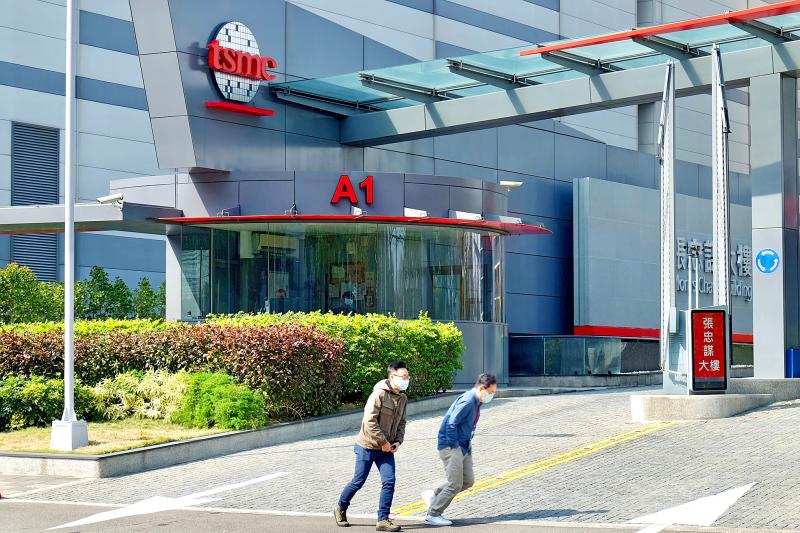Taiwan Semiconductor Manufacturing Co (TSMC, 台積電) was on Thursday set to sell local currency bonds, as it prepared for a spending blitz amid a global chip shortage.
The world’s largest contract chipmaker planned to price about NT$16 billion (US$565.25 million) of notes in three parts in an auction, though the actual issuance size might change.
The manufacturer would have to contend with a recent rise in rates globally that has sent many corporate bond yields up from record lows in the past few weeks.

Photo: Sam Yeh, AFP
The debt offering comes at a promising time for the semiconductor industry as the world scrambles its way through the shortfall for the key components in everything from smartphones to TVs and vehicles.
US President Joe Biden’s administration has pressed Taiwan, home to the largest semiconductor manufacturing sector in the world, to help resolve a shortfall of auto chips that has idled some auto plants.
TSMC last month announced that its outlay for capital expenditure this year could total as much as US$28 billion, up from US$17 billion last year.
The staggering sum would help expand its technological lead and fund construction of a planned US$12 billion fab in Arizona.
The company’s board approved a plan this month to raise up to NT$120 billion of unsecured corporate bonds in Taiwan, as well as the provision of a guarantee to a unit for dollar note issuance of up to US$4.5 billion.
“TSMC needs funds to build its US factory,” and it might decide later in the year to increase its debt issuance plans, Capital Securities Corp (群益金鼎證券) trader Baker Tu (涂瑞勝) said.
Concerns about extra future bond supply from the company could dampen demand for Thursday’s offering, he said.

Nvidia Corp chief executive officer Jensen Huang (黃仁勳) on Monday introduced the company’s latest supercomputer platform, featuring six new chips made by Taiwan Semiconductor Manufacturing Co (TSMC, 台積電), saying that it is now “in full production.” “If Vera Rubin is going to be in time for this year, it must be in production by now, and so, today I can tell you that Vera Rubin is in full production,” Huang said during his keynote speech at CES in Las Vegas. The rollout of six concurrent chips for Vera Rubin — the company’s next-generation artificial intelligence (AI) computing platform — marks a strategic

SEMICONDUCTORS: The German laser and plasma generator company will expand its local services as its specialized offerings support Taiwan’s semiconductor industries Trumpf SE + Co KG, a global leader in supplying laser technology and plasma generators used in chip production, is expanding its investments in Taiwan in an effort to deeply integrate into the global semiconductor supply chain in the pursuit of growth. The company, headquartered in Ditzingen, Germany, has invested significantly in a newly inaugurated regional technical center for plasma generators in Taoyuan, its latest expansion in Taiwan after being engaged in various industries for more than 25 years. The center, the first of its kind Trumpf built outside Germany, aims to serve customers from Taiwan, Japan, Southeast Asia and South Korea,

REVENUE PERFORMANCE: Cloud and network products, and electronic components saw strong increases, while smart consumer electronics and computing products fell Hon Hai Precision Industry Co (鴻海精密) yesterday posted 26.51 percent quarterly growth in revenue for last quarter to NT$2.6 trillion (US$82.44 billion), the strongest on record for the period and above expectations, but the company forecast a slight revenue dip this quarter due to seasonal factors. On an annual basis, revenue last quarter grew 22.07 percent, the company said. Analysts on average estimated about NT$2.4 trillion increase. Hon Hai, which assembles servers for Nvidia Corp and iPhones for Apple Inc, is expanding its capacity in the US, adding artificial intelligence (AI) server production in Wisconsin and Texas, where it operates established campuses. This

Garment maker Makalot Industrial Co (聚陽) yesterday reported lower-than-expected fourth-quarter revenue of NT$7.93 billion (US$251.44 million), down 9.48 percent from NT$8.76 billion a year earlier. On a quarterly basis, revenue fell 10.83 percent from NT$8.89 billion, company data showed. The figure was also lower than market expectations of NT$8.05 billion, according to data compiled by Yuanta Securities Investment and Consulting Co (元大投顧), which had projected NT$8.22 billion. Makalot’s revenue this quarter would likely increase by a mid-teens percentage as the industry is entering its high season, Yuanta said. Overall, Makalot’s revenue last year totaled NT$34.43 billion, down 3.08 percent from its record NT$35.52